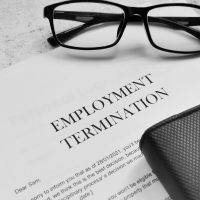Another Employer Trick: After-The-Fact Justifications For An Employee’s Termination

In employment discrimination cases alleging a discriminatory discharge, employers bear the burden of proffering a legitimate, non-discriminatory reason for the challenged termination decision. Through their decades of experience litigating discriminatory discharge cases, our wrongful termination lawyers in Marion County, Florida know employers often proffer after-the-fact justifications for the challenged termination decision. In a discriminatory discharge case, an after-the-fact justification is a reason for the employee’s discharge provided by the employer after the filing of the discriminatory discharge lawsuit. In other words, an after-the-fact justification is a reason that was not provided to the employee at the time of the termination decision. Instead, an after-the-fact justification is a reason for the termination articulated by the employer for the first time after the discriminatory discharge lawsuit was commenced.
In this article, our wrongful termination lawyers in Marion County, Florida explain how the decision in Frappied v. Affinity Gaming Black Hawk, LLC, 966 F.3d 1038 (10th. Cir. 2020) shows that after-the-fact justifications for an employee’s termination constitute evidence that the employer’s proffered reasons for an employee’s termination are unworthy of credence and that discrimination was the real reason for an employee’s termination.
Employment Discrimination Lawsuit
In that case, nine former employees brought an employment discrimination lawsuit against their former employer, Affinity Gaming Black Hawk, LLC (“Affinity”), pursuant to the Age Discrimination in Employment Act (“ADEA”). Under the ADEA, employers are prohibited from discriminating against employees because of their age. The nine former employees (the “Former Employees”) allege that they were fired because of their age in violation of the ADEA.
The Former Employees were employed at the Golden Mardi Gras Casino (the “Casino”). Affinity purchased the Casino in early 2012 and took over its operations in November 2012. After taking over the operations of the Casino, Affinity required all employee to re-apply for their jobs. All of the Former Employees re-applied and were re-hired.
After taking over operations of the Casino, Affinity also decided to lay off a substantial number of employees In January 2013, Affinity laid off 60 employees out of a total of 106. When each of the Former Employees was terminated, he or she received a “Personnel Action Form” stating either “Failed to pass introductory period” or simply “Introductory Period.” None of the “Personnel Action Forms” included any other reason for termination. The Affinity Employee Handbook defines “Introductory Period” as “the first 90 days of continuous employment with Affinity” and provided that employee performance “may be reviewed” after the end of the period. This period for the Former Employees began in November 2012, after Affinity took over operations at the Casino.
The terminations were not a reduction-in-force. Around January 10, 2013, Affinity posted an advertisement on Craigslist for 59 open positions. In January and February 2013, Affinity hired approximately 24 workers to replace the employees laid off in January 2013.
After-The-Fact Justifications
Affinity filed a motion with the trial court seeking dismissal of the Former Employees’ age discrimination lawsuit. In moving for dismissal, Affinity set forth specific and detailed legitimate, non-discriminatory reasons for its termination of each of the Former Employees, including attendance issues, violations of company policy, rudeness to customers, various performance mistakes, and attitude issues. Affinity also cited performance reviews, evaluations, written warnings, and “Corrective Counseling Notices” reflecting the reasons why the Former Employees were terminated.
The trial court concluded that the Former Employees failed to establish that the proffered reasons for their termination were a pretext for age discrimination and granted Affinity’s motion for dismissal. On appeal, the U.S. Tenth Circuit Court of Appeals reversed the trial court’s decision and reinstated the Former Employees’ age discrimination lawsuit.
Basis For Finding Employer “Lacks Credibility”
Unlike the reversed trial court, the Tenth Circuit focused on the post-hoc justifications that were not given to the Former Employees when they were fired. Pointing to the post-hoc justifications, the appellate court determined that a “jury considering this evidence could reasonably believe that Affinity lacks credibility.” The court of appeals explained that when Affinity fired the Former Employees, “it gave only the vague explanation that they had failed to pass the ninety-day Introductory Period.” For six of the nine Former Employees, the appellate court noted, Affinity “could not point to a single instance of poor performance or infraction of rules that occurred during that time.” For the other three Former Employees, the court of appeals observed, “Affinity primarily relies on evidence from before the Introductory Period.” “The inconsistencies between Affinity’s contemporaneous stated reasons and its detailed post-hoc explanations for terminating [the Former Employees],” the Tenth Circuit concluded, “could support a jury’s finding that Affinity lacks credibility” and that age discrimination was the real reason for the Former Employees’ terminations.
Free Consultation For Discharged Employees
One of the most significant decisions wrongful termination victims must make is which wrongful termination lawyers to consult with regarding their termination. As part of our commitment to assisting wrongful termination victims, an experienced wrongful termination lawyer will speak with you personally and you will receive the individualized attention your case deserves. We offer free confidential case evaluations for employees, and you will not have to pay to speak with our wrongful termination lawyers regarding your rights. We are available for consultation at your convenience, including scheduling telephone consultations for evenings and weekends.
Marion County Wrongful Discharge Lawyers
Based in Ocala, Florida and representing workers throughout Florida, our wrongful termination lawyers in Marion County, Florida have fought for the rights of wrongful termination victims for more than twenty years. If you have been wrongfully terminated or have questions about your rights as a wrongful termination victim, please contact our office for a free consultation with our wrongful termination lawyers in Marion County, Florida. Our employee rights law firm takes wrongful termination cases on a contingency fee basis. This means that there are no attorney’s fees incurred unless there is a recovery and our attorney’s fees come solely from the monetary award that you recover.


 Close Menu
Close Menu